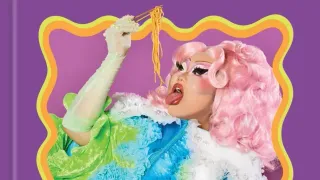October 15, 2017
Our Future: Why Do We Expect So Much from Trans Youth?
Kyle Mangione-Smith READ TIME: 5 MIN.
Recently, a friend of mine posted something on Facebook that, in the grand scheme of things, should have been a very simple request. "In case you were wondering, yes I use he/him pronouns. I know that might be difficult for some people to grapple with, but it makes a big difference to me and I appreciate it."
My friend, as you might have guessed, is a trans man. He's still young (19 years old) and only came out as trans a little over a year ago. This certainly wasn't the first time I've seen him feel it necessary to make such a post. Though many were supportive, a string of comments followed calling him a whole list of colorful things: a social justice warrior, a transtrender, a girl playing dress up, and a variety of other things you've likely come to expect from the Breitbart-reading crowd. He responded with more patience and understanding than anyone should ever be expected to in such a situation, defending his basic right to identify in a way that makes him feel most comfortable. That fact alone, to me, seemed indicative of what it's like to be a trans youth today.
That certainly wasn't the first (or last) time I've seen one of my trans friends have to defend what one would hope should be a very basic level of respect. And pronouns, if anything, are just the tip of the iceberg. Trans people are currently more visible in society than they ever have been, and while that's certainly led to some great developments for the LGBT community, it also means that they're under more scrutiny from society at large than they ever have been. This is only heightened for trans youth that have only come out in recent years.
While older trans folk certainly have their own share of problems, they're granted an air of authenticity that most recently out trans youth aren't. Because of the heightened visibility of the trans community along with the way reactionary right wing politics have developed in response, trans youth are subjected to a set of questions and requirements they're expect to meet if they wish to be respected.
How do we know they're not a "transtrender," someone only identifying as trans for the assumed social gain in liberal communities? God forbid they identify as anything other than a man or a woman. How are we expected to see them as the gender they identify as if they decide not to go through hormone therapy? If they don't present and act exactly in line with the gender they're identifying as, how do we know they're not faking it for attention?
These are the sorts of questions I see my trans friends subjected to constantly. And while it's convenient to think that this is only coming from the straight community, gay people contribute their fair share to the undue criticism that trans youth face. Often trans men are expected to publicly announce the state of their genitals if they wish to date or engage in the gay community. On the flip side, trans men are frequently fetishized within some gay communities specifically for their genitalia or for other perceived feminine aspects of their bodies.
The fact that this is all being placed primarily on the backs of young people, people who are typically in their teens, should be even more concerning. Anyone who realized they were queer at a young age likely knows the toll it can take in the formative years of one's life. Being in the closet at a young age can be damaging in its own way, but being out and having your peers openly belittle you for your identity is a whole other story. We're at a point where luckily most gay youth from urban communities can be open and accepted for who they are, but that sort of tolerance is something that still eludes the vast majority of trans youth.
It's easier now more than ever to assume that the need for the LGBTQ movement has crested, and that queer people are no longer oppressed and scorned in the way they once were in America. Certainly this is the case in many parts of the country for people belonging to sexual minorities, and that fact alone is fantastic. But the movement for acceptance of trans people, if anything, is still in its infancy. It wasn't till recently that the discussion of trans rights was even within the public sphere. When even within typically liberal circles trans people are placed under as much unreasonable scrutiny as they are, it's necessary that we continue to fight against the ways trans people are treated. Because frankly, I shouldn't need to see one of my friends argue for the most basic level of dignity on a regular basis, especially over something as arbitrary as gender identity.
Kyle Mangione-Smith is a filmmaker and student living in Boston.






